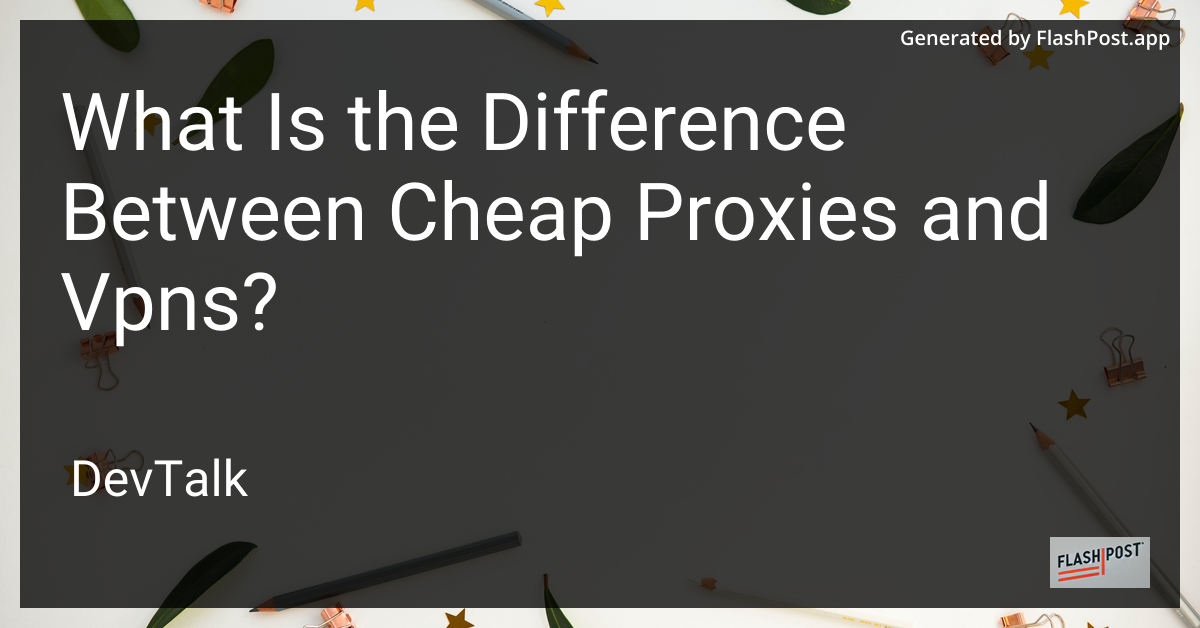What Is the Difference Between Cheap Proxies and Vpns?
 # What is the Difference Between Cheap Proxies and VPNs?
# What is the Difference Between Cheap Proxies and VPNs?
In a world where online privacy and security are growing concerns, many turn to proxies and VPNs as solutions.
These tools can help mask your IP address, enhance anonymity, and bypass geographical restrictions. However, despite their similar end goals, proxies and VPNs function in distinct ways and cater to different needs. In this article, we will delve into the key differences between cheap proxies and VPNs to help you make an informed decision.
Understanding Proxies
Proxies act as intermediaries between you and the websites you visit. When you use a proxy, your internet traffic is routed through an external server, masking your original IP address. This allows you to browse the web anonymously, making it appear as though your traffic is coming from the proxy server's location.
Types of Proxies
-
Residential Proxies: These proxies use IP addresses provided by Internet Service Providers (ISPs) and appear as genuine users. They are ideal for anonymity and avoiding detection. For more information, check out this guide on proxy providers for anonymity.
-
Shared Proxies: Many users share these proxies. They are affordable but may result in slower speeds and lower performance. If you're using shared proxies, ensure they are working correctly by learning how to verify proxy functionality.
-
Private Proxies: These are dedicated to a single user, offering better performance and speed compared to shared proxies. To understand the cost differences, see this proxy cost comparison.
Understanding VPNs
A Virtual Private Network (VPN) also routes your internet traffic through a server, but it does so with a higher level of encryption. When you connect to a VPN, all data exchanged between your device and the internet is secured, offering robust protection against potential eavesdroppers.
Key Features of VPNs
-
Encryption: VPNs encrypt your data, ensuring that sensitive information remains confidential, even on unsecured networks.
-
Comprehensive Security: They offer protection against multiple forms of surveillance and hacking attempts.
-
IP Anonymization: Similar to proxies, VPNs mask your IP address, allowing you to surf the web anonymously.
Key Differences Between Proxies and VPNs
-
Security Level: VPNs provide higher security levels with data encryption, whereas proxies typically don't encrypt traffic.
-
Speed and Performance: Proxies, especially private ones, can offer faster browsing experiences without the slowdowns sometimes associated with VPN encryption.
-
Use Cases: If anonymity is your priority, consider residential proxies. For enhanced security, especially on public Wi-Fi, VPNs are a better choice.
-
Cost: Proxies generally cost less than VPNs. Shared proxies provide the most economical option but with potential compromises on speed and security. See a detailed proxy cost comparison.
Conclusion
Both proxies and VPNs have their unique advantages and are suitable for different purposes. While cheap proxies are suitable for tasks requiring simple IP masking, VPNs offer superior security with their encryption capabilities. By understanding the differences, you can select the tool that best aligns with your privacy and security needs. Whether you choose a proxy or a VPN, always remember to verify its effectiveness and suitability for your specific requirements.